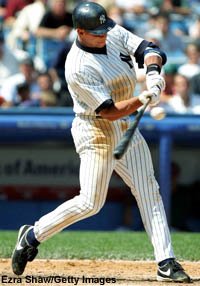Justin doesn't believe in God. He is a man of science. From his perspective his beliefs in science are contrary to the existence of God. They cannot both be true. Scientists and aetheists will tell you that everything can be explained by science, even that which cannot be proven can at least be explained. I consider myself a man of science. Research and logic can prove a lot of things about the world we live in. But certain things cannot be proven, and that is where God comes in.
The ground breaking book "Moneyball" shed liight on a new era of statistical analysis in baseball. Batting average was overrated, on base average was underrated -- a walk is as good as a hit. Stealing bases and sacrifice bunting were bad strategies. All of this could be proven using statistical models that simulated games between a team of 9 "player A" who was slow and walked a lot vs. a squad of 9 "player B" who was fast but had a low OBA. But one contention made in the book never rang true with me. Billy Beane and his disciples contend that there is no such thing as clutch hitting. It's a myth, it's luck and it can be disproven by statistics. Over time all players (except for the rare statisical anomaly) will evenutally see his numbers in the clutch regress towards his mean performance in all other situations.
Back to Alex Rodriguez for a minute. For last three years (2003-2005) A-Rod hit .302. Bases empty: .311. Runners on: .292. Scoring position: .273. Close and late game situations: .276. Those batting averages do show some decline in under pressure but are within a reasonable statistical variation. In home runs per at bat we also see a decline from how often he hits a homer with no one on, to how he does with men on base or in close, late game situations, but once again, it's close.
What about in the playoffs? When the pressure is really on? Is that when A-Rod becomes the choker we all know he is? Even though he hit .133 in the ALDS last year he still has a .305 career batting average in 118 postseason at bats. His at bats/home run ratio of almost 20 in the playoffs is worse than his regular season average but that can be attributed to facing better pitching.
Some would say this proves that A-Rod is the same hitter and likely to succeed equally in all situations. Even though I agree the statistics do show that, I can't agree. It's just something I feel when A-Rod is up and the game is on the line. I guess you could call it faith. I can't prove that A-Rod will choke in the clutch but I'm pretty sure he will. I can't prove that God created the universe, but I'm pretty sure she did.
Postscript: Since that Saturday game A-Rod stranded 7 runners in the Sunday game against the Mets and in the next week he hit a homer when the Yankees were losing 9-1, one when they were winning 4-1 (both against Boston) and two homers against the Royals in a game the Yankees would eventually win 15-4.

No comments:
Post a Comment